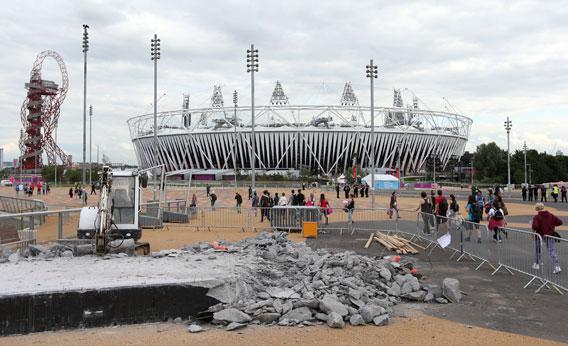The British economy is in a sorry state, thanks to a protracted double-dip recession that has pushed down GDP for three straight quarters.
This week, the Olympics are coming to London. Will they revive Britain’s economic life? Certainly Prime Minister David Cameron hopes so, arguing that the games should be associated with a £13 billion boost to the British economy over four years. Cameron’s certainly not the first political leader to tout the economic benefits of hosting the world’s premiere sporting event. But are Cameron and the boosters right?
In the short-term, yes: The London games are likely to provide a boost. But the long term is iffy. Research on the economics of hosting the Olympics shows that hosts often do see real benefits. Yet there’s no guarantee these will materialize, and it seems possible to secure the gains without actually staging the games.
One typical concern about an Olympics is that it’s a waste of money. Olympic cost overruns often reach the billions. But the United Kingdom is currently plagued by high unemployment and is able to take advantage of super-cheap borrowing costs. Under the circumstances, a potential “waste” of money is much less important than the waste of human potential involved in not spending money and not employing people on Olympics-related activities. In a struggling, high-unemployment economy, it’s better to waste some of this Olympic spending on cost overruns than to not spend at all. Olympic spending, in essence, is a kind of spending that all politicians favor—even ones who normally push for austerity. (A skeptical Time article argued the games won’t bolster British growth by relying on a Moody’s analysis concluding that most of the job-creating infrastructure spending has already happened. That distinction is important for economic forecasters, but it still tends to indicate that the games have been good for Britain.)
The Olympic stimulus spending does frustrate Britons who have been enduring Cameron’s austerity policies. Complaining about the hefty Olympic price tag in the New York Times Magazine, China Mieville wrote that “in this time of ‘austerity,’ youth clubs and libraries are being shut down as expendable fripperies; this [Olympics] expenditure, though, is not negotiable.” If Britain weren’t on the hook for the Olympics, would Cameron have kept social welfare expenditures at higher levels, or would he have still pushed them down, without having the offsetting stimulus of the Olympics spending?
Still, the Olympic Games occur on a planning horizon that’s much too long to be well-designed fiscal stimulus. London’s 2012 bid was submitted in July of 2003 under the aegis of Cameron’s predecessor’s predecessor as prime minister, so countering the current recession certainly wasn’t the goal of the bid. And in a full-employment economy, the impact of Olympic-related spending is as likely to be negative as positive. An influx of tourists into hotel rooms, for example, could literally crowd out more substantive business travel.
In a study of the 1996 Atlanta games, Robert Baade and Victory Matheson concluded (PDF) that “if beginning in 1994 all the economic growth beyond Atlanta’s normal experience could be attributable to public expenditures in conjunction with the Olympics, Atlanta spent approximately $63,000 to create a permanent full- or part-time job.” This they deem a failure on the grounds that “past public works programs have spent approximately the same amount of money” per full-time job. In other words, the Olympic spending replaced more efficient forms of economic activity.
A more positive finding comes from Andrew Rose and Mark Spiegel, who determine that countries that host an Olympic games enjoy a 30 percent increase in exports that appears to be both durable and statistically robust. So are the Olympics really a boon? Maybe not. Their same statistical test finds an essentially identical benefit for countries that submit a serious Olympic bid but don’t make the cut. They hypothesize that the bid itself, rather than the games or the related spending, is the important issue—a costly and credible signal to the international community of policy reform and openness to globalization. The Beijing Olympics, in other words, was part of a process of Chinese political and economic development that would have been taking place even if the event had ultimately been awarded to Brazil instead.
And this, when you think about it, turns out to be the general issue with Olympic spending as an economic development strategy. Whatever benefits might accrue to you from stuff you did to mount a winning bid could almost certainly be done outside the context of a sports mega-event. That’s because the main gains, when they exist, stem from overall infrastructure rather than sports infrastructure. A fairly optimistic survey of summer games from the Autonomous University of Barcelona’s Olympic Studies Center, for example, particularly praises its hometown 1992 Olympics for the fact that “building work related to sport made up only 9.1 percent of the total investment connected with the games.” Atlanta, by contrast, was a development
failure “because they tried to organize the games with no urban impact.”
This is mostly a long-winded way of saying that investments in sports infrastructure are generally useless. Baade and Matheson cite Atlanta’s 1,400 acre International Horse Center as a typical example of a costly facility with no real post-Games value. Cities that profit from the Olympics do so because they use them as a pretext to invest in transportation infrastructure that would be valuable even if the competition never happened. Viewed this way, the event is, at best, a kind of trick to dupe the political system into making the kind of long-term investments that ordinary politics generally slights. At worst it’s a costly boondoggle that crowds out more valuable activity.
Read the rest of Slate’s coverage of the London Olympics.
